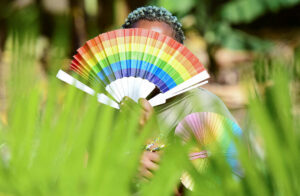
Uganda enacts harsh anti-LGBTQ law which includes death penalty
Uganda’s Controversial Anti-LGBTQ Law: A Step Backwards for Human Rights
Introduction:
In a shocking move, Uganda has recently enacted a harsh anti-LGBTQ law that includes the death penalty as a punishment. This development has sparked widespread outrage and concern among human rights activists and organizations worldwide. The law represents a significant setback for LGBTQ rights and raises serious questions about Uganda’s commitment to equality and inclusivity. In this article, we delve into the details of this controversial legislation and explore its potential consequences.
The Background:
Uganda has a history of discriminatory laws and policies targeting the LGBTQ community. Homosexuality was already criminalized in the country, but the new law takes the persecution to a whole new level. Under this legislation, individuals convicted of aggravated homosexuality can face the death penalty, while those found guilty of lesser offenses can be imprisoned for life. The law also criminalizes the promotion of LGBTQ rights and imposes severe penalties on anyone who supports or advocates for LGBTQ individuals.
International Outcry:
The international community has swiftly condemned Uganda’s anti-LGBTQ law, with governments, human rights organizations, and activists expressing their deep concern. Many argue that the law violates fundamental human rights, including the right to life, freedom of expression, and freedom of association. Several countries have called for diplomatic action, including the imposition of sanctions, to pressure Uganda to repeal this discriminatory legislation.
Impact on LGBTQ Community:
The enactment of this law has created a climate of fear and persecution within Uganda’s LGBTQ community. LGBTQ individuals now face increased risks of violence, discrimination, and social exclusion. Many fear that the law will drive LGBTQ individuals underground, making it even more challenging for them to access healthcare, education, and employment opportunities. The law also perpetuates harmful stereotypes and stigmatization, further marginalizing an already vulnerable community.
Uganda’s Justification:
Uganda’s government argues that the law is necessary to protect the country’s cultural values and traditions. They claim that homosexuality is a Western import that threatens Uganda’s social fabric. However, critics argue that this justification is flawed and fails to recognize the inherent dignity and rights of LGBTQ individuals. They emphasize that human rights are universal and should not be subject to cultural relativism.
International Pressure and Advocacy:
Human rights organizations and activists are working tirelessly to challenge Uganda’s anti-LGBTQ law. They are engaging in advocacy efforts, both within Uganda and internationally, to raise awareness about the discriminatory nature of the legislation. These organizations are also providing support and resources to LGBTQ individuals in Uganda, helping them navigate the challenging legal and social landscape.
The Way Forward:
Repealing Uganda’s anti-LGBTQ law is crucial for the protection of human rights and the promotion of equality. The international community must continue to exert pressure on Uganda’s government to reverse this regressive legislation. It is essential to support local LGBTQ organizations and activists who are at the forefront of the fight for justice and equality. By standing together, we can create a world where every individual, regardless of their sexual orientation or gender identity, can live free from discrimination and persecution.
Conclusion:
Uganda’s recent enactment of a harsh anti-LGBTQ law, including the death penalty, is a grave violation of human rights. This legislation not only perpetuates discrimination and violence against LGBTQ individuals but also undermines the principles of equality and inclusivity. The international community must unite in condemning this law and supporting efforts to repeal it. Only through collective action can we strive towards a more just and inclusive world for all.
